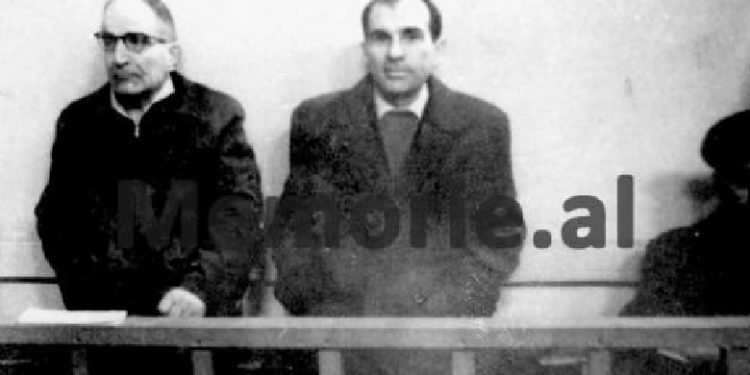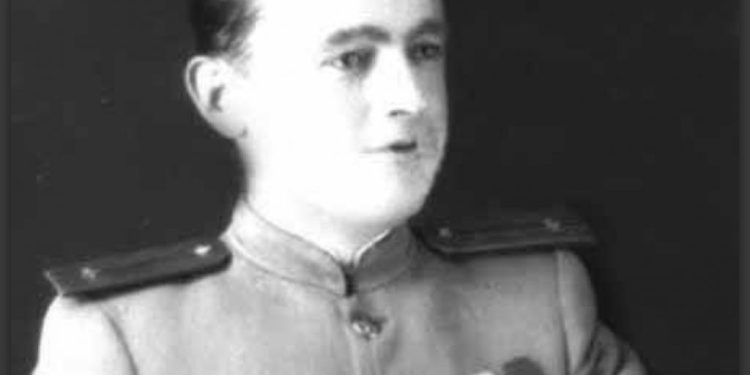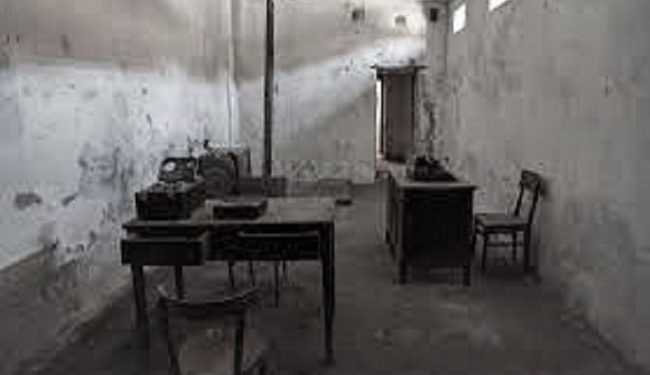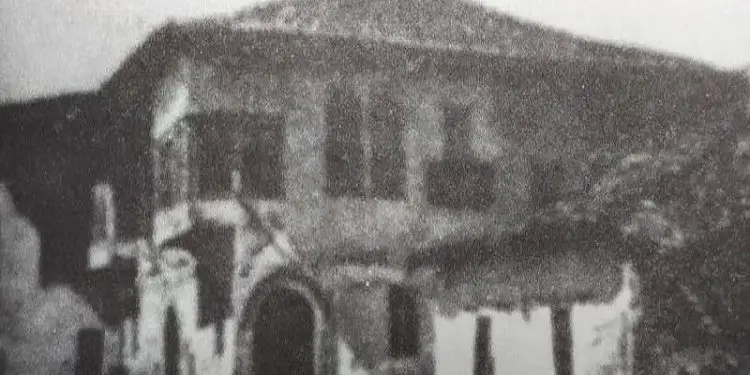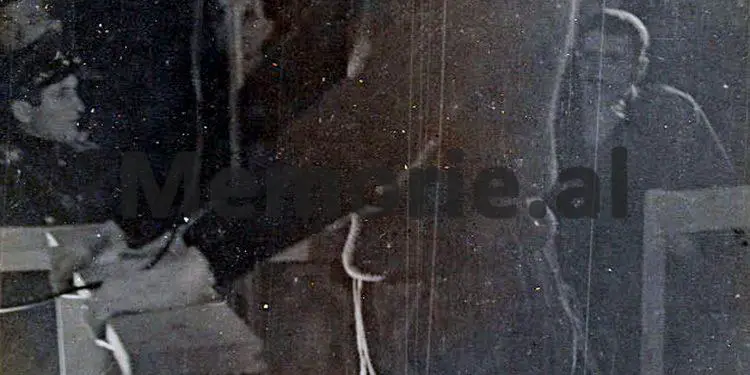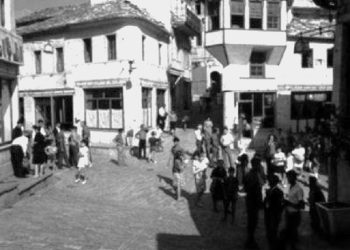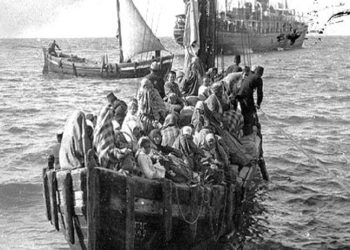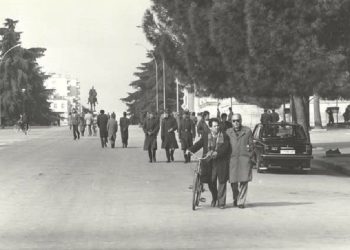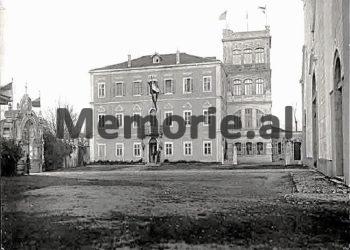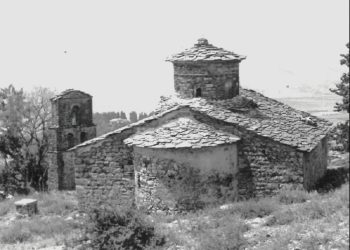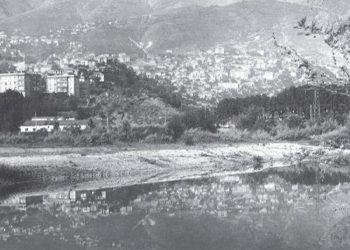By Father Zef Pllumi
Memorie.al / In addition to others, there was another lack added to me. At this time, the prison ration was only 400 gr. bread and a bowl (1/2 lt.) of water: they could give more water, depending on the dish and the occasion. I didn’t have any help from my family, like most of the prisoners. While living with Brother Gjon, he had supplied me with 2 pairs of shoes, but now we had nowhere to send them?! The changes are removable and changeable again, even with those left at the beginning of the week. I ate the bread that they gave me with a rush and then I put my head in the big basin, like cows, to drink a drop of water. It happened by chance that un to drink in this way, Ali Xhunga passes through the corridor. He was the chief investigator in charge of the Church Prison. He stopped and said:
– “Why do they drink like that”?!
I answered that the basin was big and with hands tied like a church to hold it.
– “Where are the food containers?”
– “I don’t have a toilet other than this pelvis.”
– “What about the bread, what do you send it with”?
– “Only with water”.
– “What is your profession?”
– “Franciscan friar”.
– “Priest”?!
– “Gadi priest: deacon”.
– Deacon”?!
– “Yes, deacon”.
– “Look, – he said to me – I am sending you to a hodge, who has so much food that he brings it back to the house every day. I will take you to him and pray to God together: he in Turkish, you in Albanian. What do you say?
– “I’m ready, so do you.”
– “Take the trouble”!
I gathered them and started after him. The guard was ready. He opened door No. 24.
– “Look,” he said – this is your priest. Don’t fight together, because we will be beaten.”
The prison guard let me bring my mattress with his. When I lay down on the mattress, he tied us together, hand to hand, foot to foot.
It wasn’t Hoxha: it was Xhabir Dibra, the brother of dentist Dr. Ibrahim Dibrës, who had studied in Austria, from a prominent Muslim family of Shkodra. The other brother had a doctor’s degree at the University of Bologna (Italy) as a dentist-laboratorian. He was a handsome white boy, short and fat. He told me that his brother, Dr. Ibrahimi was married to Av.’s sister. Myzafer Pippa, who had two daughters, little angels. Dr. Ibrahimi was also in prison and, therefore, his only sister was left in the house, together with his mother: Nijen.
Oh great God, why did they arrest all those people?! Only because they were western markets?! Muslims and Westerners?! This was the big fault! Christian and Muslim could not live together! So this was the concept of the new rulers!
Xhabiri was a true nobleman. About his religion, about Muhammad, he almost didn’t know the religion, but he had a fixed faith in God: creator and regulator of everything. He believed. He respected me, as a man we dedicated ourselves to this God. In terms of age, he was two or three years ahead of me. All good things come from home. The room was full, but, because of the mice, he had put the food and bread on the window sill and closed it. More like:
– “And you, where do you have the food”?
– “I do not have”.
– “Nothing”?
– “No, nobody makes me”.
– “Do you have a family”?
– “I have them all, but they are in the mountains and they don’t know the city: even in the future, the citizens can make fun of them.”
– “What about the Franciscan Assembly”?
– “They will be yours forever, not that I don’t know if anyone is left alive.”
– “See, – he told me – I, thank God, have food not for one, but for three or four people. My Nana is very generous, and so is my sister. They fall on me more, so that I can do well, they gave it to others. That’s why I have everything, it’s yours too, don’t come and take it, and don’t even say no”.
But I said; no. I can’t eat bread for months, because I can’t eat it.
In the morning, full meals came to him. Learned almost all those good things, which they had in excess. It was well known that the policemen themselves were beaten, that they had no reason to send them back to prison. I did not agree to eat together, it seemed to me an injustice, which I owe to him and the family. He didn’t just listen. I insist: “Oh, we will eat together, or no one”. I was very wet, but very calm. Throughout my youth, I had practiced mortification, among which I was very stubborn. But, that day, he ran into a nail saw. I didn’t take any of his food, he didn’t eat either. When Elez Mesi came with them, they all turned back. Fifth:
– “Jabir, you didn’t touch them”?!
– “No, – he said – but tell my sister, so that they will fall for me for two”.
When he went he said to me: “Aren’t you ashamed, you despise the dishes that my nana and sister cook? Or, you priest, are you used to eating well, don’t you like our dishes?! I’m telling you that western dishes are very tasty, but even my grandmother and sister know how to cook them, better than oriental dishes”. He was really insulted when he saw me eating dry bread.
I tried with mine to explain to him that each man had his own risk, which he must take with solitude and conscience, and not to be a burden to his husband, because from this arise inadequacies and contradictions, and so each one is better at his own work. He told me that he and his family believed in God as Muslims.
– “Nana,” he said, “says that every good Muslim must pay zakat, and not only does she give zakat only for widows, but she insists that we, her sons, must also give zakat, that it is our duty to to God Therefore, for me, here you are instead of God”.
I asked him to forgive me and I said: “I do not intend to explain the Christian doctrine, nor to make a Christian, but the gospel itself says; that the love of God is shown most in the love of the husband”. Therefore, I rejoiced at his steadfast faith and agreed to eat as a beggar in his house. Since that day, I have a real brother. This true brotherly love remained with us all our lives, not only with him, but also with other family members, both Nije’s mother and sister. Maybe later, we will have a chance to talk again, because during the prison, everyone else knew from him and from me that we were real brothers.
With Xhabir Dibra, I have been working hand in hand and foot by foot for almost five months. Unfinished stories happened to us that, perhaps, the reader may doubt the truth, but what I write, are not fantasy or inventions, but all true.
After two or three weeks, in our room there were four more, married as a couple: Simon Harapin and Gjok Doda, sie and Man Krujë and Lorenc Vata. Simon, in his late thirties: a wise and cultured man, specialized as a forest engineer. Mani, who was the oldest in the ode, was in the gendarmerie, with low ranks. Both of them smoke a lot. But the bells in the Church Prison were lit only once a day, in the morning, when the door was opened for services.
Therefore, they both smoked it in turns and, when they were tired, he liked the rest of us, who don’t smoke, so he held the cigar and lit it. So, all the rest of us in that case, took the vice with their tobacco. Gjoka was a small merchant, originally from Mirdita, and he sold coal together with his sister. He was the only one in our room who had not yet gone through the interrogator and did not know why he had been arrested. One day of days, yesterday. We couldn’t stop listening to the fairy for many days.
The assembly was large, there were many gardens with trees where you could hang, many stairs and many dungeons. Every howl of torture we heard, we asked each other: “Is this the ghost of Gjoka? No…”?! After a couple of weeks, we clearly heard his voice shouting: “Down with Stalin! Down with Stalin! Long live Christ! O cruel Katila, my soul goes to Christ and, b… mine, takes it for a meal, Stalin”. This animal came and was accompanied by the noises of the soldiers, who beat him mercilessly, until he fainted. After half an hour, he started again with loud calls: “Long lives Christ the King”! “Down with Stalin”! “The soul of Christ and, ass… of Stalin”.
This last phrase, he repeated over and over again, until the merciless beatings of the soldiers made him faint again. This went on all day. At night they let him scream. Also the next day, until, on the second night, it seems that they tied his mouth with some cloth, because only a drowning sound was heard. In the morning of the next day that powerful bird ran all the way down the long corridor we were met with the shouts, the beatings and the insults of the soldiers who, just as they were bound, crashed into our room. Desolate Gjoke. There was nothing left of him, except for that ghost, who was now starting to take care of him and repeated the same words: “The soul of Christ was made by… Stalin”!
After some five minutes, Simon Harapi took it easy. He was stunned. Then Simon took a pitcher of water and made them drink. The chest was present, but with his hands tied, he lifted the kettle, as he drank it. They were burning for water. It fell into silence. He slept until the afternoon and started shouting, again the same words. Simon came to him and gave him a hangar, but he sent him away. See how they scare them. The chest was crazy. He didn’t know where he was. He didn’t speak a word anymore, except for his own calls: “Soul of Christ and ass… Stalin”! Even under the sun, he continued to utter the same words. It hurt our souls. We treated him better, fed him, calmed him down, but he always did the same things.
Only after a week it seemed that he started to understand that we were his friends, the ones we had suffered together, in that room. He left the hole, but it wasn’t right. He started by complaining that his head hurt, but he informed us. Then we were happy that Gjoka gave signs that he would recover again. After another five days, the daily life of the prison was normalized: in that room it continued as before. Now with Xhabir, we were real brothers, and he had devices with lights, which he washed on his back. Every time the letters came from Xhabir’s house, he looked at the small card where his name was written and read some words written with a felt tip, so that it wouldn’t be seen: “Goodbye”.
And through that little card, you connect with your back, your family, your heart. The answer was more difficult as it was written, that in the prison, there were no prisons, however some circumstantial means, such as wood boards, completed the work. Sometimes, even the kindness of one of the guards served to send them an order orally.
At the beginning of July, two of the guards, who behaved well with us, disappeared. They behaved well, they told me that they didn’t handcuff us, like other policemen, that they could give some news to the families.
There was a boy from Korça, his name was Dhimitër, he sang very beautifully and, before starting the control of the handcuffs, he started the song, as a signal that it was he, and not Hekurani or Smajli, who was strangling him to the bone. But as it turned out later, Dhimitri and Tomorri were arrested, with the accusation; “as a liaison of the prisoners”!
After a few days, Jabir also arrived. I repeat alone. But it didn’t last long, this loneliness. After three or four days, an old man cut me off: Qazim Danin, a lawyer by profession. He studied law in Istanbul, where he also attended high school. I can use his knowledge and knowledge in the discussion, but never his goodness, his pure soul. I told him I was a Franciscan. He asked me about all the “brothers and sisters”, he told me that he did not know them personally, but he had read their writings and watched their work.
– “It’s true, – he told me that legally, they are known by the name “Small Friars”, but in reality they are “Mdhej Friars”, to whom Albania should be grateful, not only for freedom, but also rather, for culture. The Bektashis and the Franciscans are the main ones who have shaped the national consciousness. I – he told me – am a Sunni, I believe in God and in the Islamic religion, but for the national issue, we thought that we were leaving Turkey; we were also leaving the religion. We fought blindly, in 1914, against the flag of “Crow”. We heard Hana and Hylli, the Turkish, Islamic symbol. But then we realized that it was not a betrayal of the Islamic Religion, but rather the Motherland.
We have made many mistakes due to ignorance; we thought that Islam and Turkey are one. We were wrong, and now that we have realized it, we are one and the same brotherhood, with you Franciscans and Bektashis. Now everyone knows this, except for those who have the power in their hands, they don’t know what they have. They are Ajamij, they do not understand the Qur’an, nor do they want to know the Qur’an. Pasha is on his knees. But these are not the other church, but some vagrants, vagabonds, who know neither religion, nor homeland, nor Knowledge, nor Iman. Ruena God from them.
At that time, I had formed the belief that, just like a small child, he has two of his own: that of his father, inheritance, and that of his mother (uncles), as well, in addition to his paternal homeland, he also had the place where he studied, where he was spiritually formed. That’s why we’re talking about Istanbul and Turkey. He had lived 25 years in Turkey; he had also spent time in Austria.
But Istanbul for him was the biggest miracle. He told me in detail about the colossal ramparts, about the water cisterns, about the mosques and bridges, and among other things, he told me that Istanbul was the biggest city of the Albanians, because no other city in Albania had so many Albanian residents. as much as Istanbul had.
He was also interested in the life we spent in the Franciscan Assembly and in our studies. Often times he was surprised and said to me: “Why, in Albania, did you learn all this knowledge”?! “I didn’t know them personally, neither Fishta, nor Father Anton Harapin, nor Father Gjon Shllaku, but, as I have heard from others, they did not have a bad reputation, among the great cultured people that Europe had”! Memorie.al




